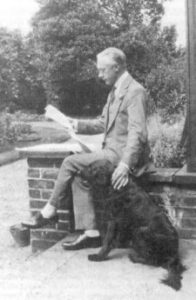 What Is the Alexander Technique?
What Is the Alexander Technique?
Frederick Matthias Alexander (1869–1955) was an Australian actor and reciter who developed chronic laryngitis whenever he tried to perform. After doctors could find no physical cause, Alexander decided to find a solution himself.
Eventually, Alexander discovered that his vocal difficulties arose from excess muscle tension in his neck and back, as well as his habitual belief that the goal of performance was more important than how he performed. By careful, patient trial and error, he learned to transform his harmful physical and mental habits to more easeful, more efficient ones.
After successfully restoring his vocal abilities, Alexander taught his technique first in Australia, then in Britain and the United States. His students included not only fellow actors but also athletes, doctors, and ordinary people of all ages. Eventually, he had too many students to teach himself, so he began to train others to teach his discoveries. Teacher-certification programs have been founded in Britain, the United States, Canada, Europe, and other locations.
Quick References
- Frequently Asked Questions
- The Complete Guide to the Alexander Technique
- History of the Alexander Technique
- Medical Research and Endorsements
- Body Learning: Podcasts on the Alexander Technique
- Alexander Technique Blogs
- 52 Reasons to Try Alexander Technique
Suggested Reading
General:
- F. M. Alexander, The Use of the Self
- Pedro de Alcantara, The Alexander Technique: A Skill for Life
- Michael Gelb, Body Learning: An Introduction to the Alexander Technique
- Deborah Caplan, Back Trouble: A New Approach to Prevention and Recovery
For Musicians:
Sports:
- Malcolm Balk and Andrew Shields, Master the Art of Running: Raise Your Performance with the Alexander Technique
- Steven Shaw, Master the Art of Swimming: Raise Your Performance with the Alexander Technique
Articles:
- British Back Pain Study
A University of Southampton study published in 2008 found that back-pain patients who studied Alexander Technique gained significant improvement. - The British back pain study was also cited in: O, the Oprah Magazine
- For questions and answers with Paul Little, a professor of primary care at the University of Southampton and the lead author of the British back pain study, see this New York Times blog.
Additional Links
- The American Center for the Alexander Technique (ACAT), New York
- The American Society for the Alexander Technique (AmSAT)
- The Complete Guide to the Alexander Technique
An excellent on-line resource
